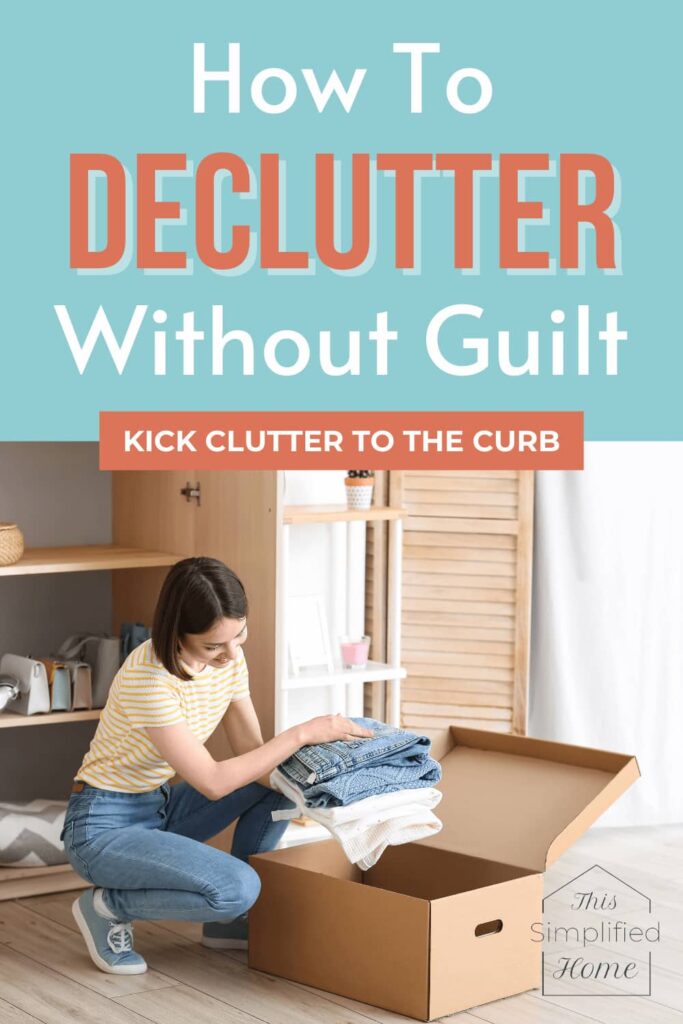Declutter Without Guilt: A Guide to Simplifying Your Life
Understanding the Emotional Weight of Clutter
Clutter can have a profound impact on our emotional well-being. It can create feelings of overwhelm, stress, and even guilt. Many people hold onto items out of a sense of obligation or fear of letting go. This emotional attachment to possessions can make decluttering a difficult and guilt-ridden process. However, it’s important to understand that letting go of clutter is not a reflection of your worth as a person. It’s simply a way to create more space and clarity in your life.
One way to overcome the emotional weight of clutter is to shift your mindset. Instead of focusing on the act of getting rid of things, focus on the benefits of decluttering. Think about how much lighter and freer you will feel when you let go of what no longer serves you. Remind yourself that you are making room for new opportunities and experiences. By reframing the decluttering process as a positive and empowering experience, you can let go of guilt and embrace the benefits of a simplified life.

Another helpful strategy is to practice self-compassion. Be gentle with yourself throughout the decluttering process. It’s okay to feel overwhelmed or emotional as you sort through your belongings. Allow yourself to acknowledge these feelings without judgment. Remember that decluttering is a journey, not a race. Take breaks when needed and celebrate your progress, no matter how small. By showing yourself kindness and understanding, you can declutter without guilt and create a more peaceful living environment.
The Benefits of Decluttering
Decluttering has numerous benefits beyond just creating a tidy living space. It can also have a positive impact on your mental and emotional well-being. When you declutter your home, you are essentially decluttering your mind. Clearing out physical clutter can help reduce feelings of stress and overwhelm, creating a sense of calm and peace in your living environment. Additionally, a clutter-free space can improve your focus and productivity, making it easier to accomplish tasks and goals.

Another benefit of decluttering is the financial savings it can bring. By purging unnecessary items from your home, you can avoid the temptation of buying duplicates or replacements for items you already own. This can help you save money in the long run and reduce unnecessary expenses. Additionally, decluttering can increase the value of your home if you choose to sell it in the future. A clutter-free, well-organized space can make a positive impression on potential buyers and lead to a quicker sale.
Decluttering can also have a positive impact on your relationships. A cluttered home can create tension and discord among family members or roommates. By decluttering and creating a more harmonious living environment, you can improve communication and strengthen your connections with others. A clutter-free space can also make it easier to entertain guests and host social gatherings, fostering a sense of community and togetherness.
Practical Tips for Decluttering Without Guilt

If you’re ready to declutter your home but are struggling with feelings of guilt, there are several practical tips you can follow to make the process easier. First, start small. Instead of trying to tackle your entire home in one go, focus on decluttering one room or area at a time. Breaking the process down into smaller, more manageable tasks can help prevent overwhelm and reduce feelings of guilt.
Another helpful tip is to set clear goals and priorities for your decluttering project. Decide what areas of your home are causing you the most stress or clutter and prioritize those spaces first. Create a plan for how you will tackle each area, whether it’s by category (e.g., clothing, books, kitchen items) or by room. Having a clear roadmap can help keep you focused and motivated throughout the decluttering process.
It’s also important to be realistic about what you can accomplish. Decluttering is a process that takes time and effort, so don’t expect to completely transform your home overnight. Set realistic expectations for yourself and be patient with the process. Remember that it’s okay to take breaks and ask for help if needed. Enlist the support of family members or friends to help you declutter and make the process more enjoyable.
Cultivating a Mindful Approach to Decluttering
When it comes to decluttering without guilt, taking a mindful approach can be incredibly beneficial. Mindfulness involves being fully present and aware of your thoughts, feelings, and surroundings in the present moment. By practicing mindfulness while decluttering, you can create a sense of calm and focus that can help reduce feelings of guilt and overwhelm.
One way to cultivate mindfulness during decluttering is to stay present and focused on the task at hand. Avoid getting caught up in thoughts of the past or future, and instead, focus on the present moment. Take deep breaths and tune into your senses as you sort through your belongings. Notice the textures, colors, and scents of the items you are handling. By staying present and mindful, you can create a sense of peace and clarity that can make the decluttering process more enjoyable.
Another way to practice mindfulness while decluttering is to practice gratitude. Take a moment to appreciate the items you are choosing to keep and thank them for their service. Express gratitude for the memories and experiences they have brought you. By acknowledging the value of your belongings and expressing gratitude for them, you can let go of guilt and create a more positive mindset around decluttering.
Letting Go of Sentimental Items
One of the biggest challenges when decluttering is deciding what to do with sentimental items. These are the possessions that hold emotional value and memories, making them difficult to part with. However, it’s important to remember that sentimental items are just that – items. The memories and emotions they evoke are within you, not within the object itself. By letting go of sentimental items, you are not letting go of the memories or emotions associated with them.
When deciding whether to keep or let go of sentimental items, ask yourself a few key questions. Does this item bring me joy or serve a practical purpose in my life? Am I holding onto it out of guilt or obligation? Can I still cherish the memory or emotion without physically holding onto the item? By reflecting on these questions, you can gain clarity on which sentimental items truly add value to your life and which may be weighing you down.
If you decide to let go of sentimental items, consider creating a ritual to honor their significance before parting with them. Take a moment to reminisce on the memories they hold, express gratitude for the joy they have brought you, and thank them for their service. This can help you let go with a sense of closure and appreciation, rather than guilt or regret. Remember that letting go of sentimental items is a personal choice, and it’s okay to take your time and process your emotions as you declutter.
Embracing Minimalism and Simplicity
One of the key principles of decluttering without guilt is embracing minimalism and simplicity. Minimalism is a lifestyle philosophy that focuses on living with less and prioritizing what truly matters to you. By decluttering your home and letting go of excess belongings, you can create a more minimalist living space that is clean, organized, and intentional. This can help reduce feelings of overwhelm and stress, allowing you to focus on what brings you joy and fulfillment.
To embrace minimalism in your decluttering journey, start by identifying your values and priorities. What is truly important to you in life? What brings you joy and fulfillment? By clarifying your values and priorities, you can determine which possessions and belongings align with them and which do not. Letting go of items that no longer serve you can create space for what truly matters in your life, whether it’s relationships, experiences, or personal growth.
Another way to embrace minimalism is to adopt a less is more mentality. Instead of constantly acquiring new possessions, focus on simplifying and streamlining your belongings. Consider implementing a one in, one out rule, where you donate or sell an item every time you bring a new one into your home. By being intentional about what you bring into your space, you can prevent clutter from accumulating and create a more minimalist environment that supports your well-being.
Creating Sustainable Decluttering Habits
Once you have decluttered your home and created a more minimalist living space, it’s important to maintain sustainable decluttering habits to prevent clutter from building up again. Sustainable decluttering involves adopting practices and routines that support a clutter-free lifestyle in the long term. By incorporating these habits into your daily life, you can prevent overwhelm and guilt from returning and maintain a sense of calm and clarity in your living environment.
One sustainable decluttering habit is to regularly assess your belongings and let go of items that no longer serve you. Set aside time each month to review your possessions and identify any items that no longer align with your values or priorities. By regularly decluttering and purging unnecessary items, you can prevent clutter from accumulating and maintain a minimalist living space that supports your well-being.
Another important habit is to be mindful of your consumption habits and make intentional choices about what you bring into your home. Before making a purchase, ask yourself if the item truly adds value to your life and aligns with your values. Consider whether you have a genuine need for the item or if it is simply a fleeting desire. By being intentional about what you bring into your space, you can prevent clutter from building up and create a more sustainable living environment.
Seeking Support and Accountability
Decluttering can be a challenging and emotional process, especially if you are struggling with feelings of guilt or overwhelm. To make the decluttering journey easier, consider seeking support and accountability from loved ones or professionals. Enlist the help
